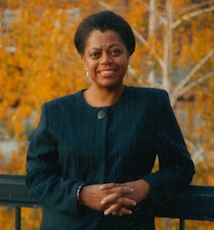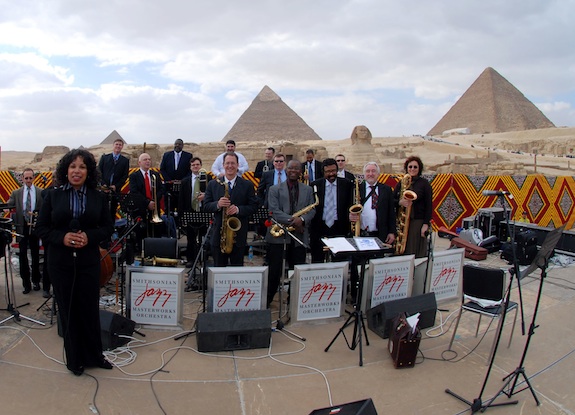Smithsonian’s Very Own Maestro David Baker is All That’s Jazz
David Baker, the leader of the Smithsonian Jazz Masterworks Orchestra, steps down, leaving a soaring legacy in his wake
![]()

David Baker, front row with glasses, with the Smithsonian Jazz Masterworks Orchestra.

Guest blogger, Joann Stevens is the program manager of Jazz Appreciation Month at the American History Museum. Courtesy of the author
At age 80, David Baker has slowed his pace but still has the jazz lean and look of musicians from an earlier era. Proving that old beboppers don’t grow stale, they just change rhythm and keep swinging, the elegantly dressed, Baker recently braced himself with a loose, bemused expression on his face, as if enjoying a private joke, while fans, friends, and musicians buzzed excitedly around him, taking photos, offering platitudes and congratulating him for his two decades of service as the director and artistic advisor of the Smithsonian Jazz Masterworks Orchestra (SJMO).
Baker recently stepped down to become SJMO’s Maestro Emeritus.
“They’re wonderful! I can’t believe I’ve just found them just as I’m leaving the area,” gushed a woman who had brought several family members to the Baker Tribute and SJMO Holiday Concert at Church of the Epiphany earlier this month. “Now I don’t want to move to Florida!”
Another fan, education consultant Anne Saunders raved: “I’ve been coming to these concerts 20 years. David brought us this! Washington didn’t have anything this wonderful before we got this from David Baker.”
The orchestra was taking a break. They’d just delivered a swinging, hot concert of cool jazz featuring only Baker compositions. Tunes with titles like To Dizzy with Love, Screamin’ Meemies and Some Links for Brother Ted were rich fodder for musicians who played their beloved maestros music with fun and fervor under the direction of the orchestra’s longtime lead alto sax player Charlie Young. An educator at Howard University, Young has been named SJMO conductor.
“I won’t try to fill David Baker’s shoes. No one can,” said Young, who has his own impeccable credentials as a performer and recording artist with organizations such as the National Symphony Orchestra, the Count Basie Orchestra, and the Seattle Symphony Orchestra.
“David has built an institution that will last like so much at the Smithsonian—beyond us,” said Cedric Hendricks, who worked with Congressman John Conyers (D-MI) to successfully pass public law in 1987, recognizing jazz as an original American art form. ”That’s the beauty of the Smithsonian. It is the nation’s treasure chest.”

Baker performed with the SJMO at the pyramids in Egypt.
Baker is a living Smithsonian treasure. He is recipient of the Institution’s coveted James Smithson Medal, named in honor of its founding benefactor. His tenure with SJMO began in 1991 as co-director of the orchestra after he invited Gunther Schuller, a mentor and friend, to join him (Schuller stayed with the orchestra five years) in building a body of world-class work. Baker’s achievements include: The development of a SJMO music library of more than 1,200 pieces; he saw the then newly acquired Duke Ellington Collection come off the archive shelves and become the centerpiece of SJMO performances, education, and public events worldwide. Transcending performances took place at the White House Jazz Festival, Harlem’s Apollo Theater, the Kennedy Center, the National Cathedral, the Cultural Olympiad at the Olympic Games in Atlanta, as well as across the nation and several countries, including in Egypt at the Pyramids.
Baker’s ever present wit and playfulness became his signature. Nationally syndicated columnist David Broder once noted that Baker energized a museum crowd telling them: “We’re in a museum, but John (Hasse, the museum’s music curator) has got clearance for head nodding, foot stomping and butt-shaking. So go ahead! And they did.”
A new book, David Baker: A Legacy in Music, celebrating his life, tells the story and countless others that illuminate the Maestro’s extraordinary career, talent and geneorsity of spirit.
With musical gifts that extend from the classical world to all that’s jazz, Baker is a virtuoso performer on multiple instruments. He is a veteran of the bands of George Russell, longtime friend Quincy Jones, Stan Kenton, Maynard Ferguson, and Lionel Hampton. Included among his many honors is an Emmy for his musical score for the PBS documentary “For Gold and Glory“, “Living Jazz Legend” recognition from the Kennedy Center, the NEA Jazz Master’s Award, Sonneborn Award, and the Indiana Historical Society’s Living Legends Award.
Currently he is Distinguished Professor of Music and Chairman of the Jazz Department at the Indiana University School of Music in Bloomington. He has taught and performed throughout the USA, Canada, Europe, Scandinavia, Australia, New Zealand, and Japan. And his compositions total more than 2,000, and include jazz and symphonic works, chamber music, ballets, and film scores. His credentials don’t stop there. He has served as Chair of the Jazz Faculty of the Steans Institute for Young Artists at the Ravinia Festival in Chicago, and numerous times on the Pulitzer Prize Music Jury, where he was instrumental in bestowing that coveted prize on jazz saxophonist Ornette Coleman in 2007.
“It has been a supreme honor playing under David Baker,” said SJMO trombonist, Jen Krupa, who said she studied Baker’s work and books before joining the orchestra. ”It’s a dream come true.”
To play in SJMO was “To be in the university of David Baker,” added SJMO trumpeter Tom Williams.
Catch the next SJMO performance February 23, 2013. Tickets here.
Joann Stevens is program manager of Jazz Appreciation Month (JAM), an initiative to advance appreciation and recognition of jazz as America’s original music, a global cultural treasure. JAM is celebrated in every state in the U.S. and the District of Columbia and some 40 countries every April. Recent posts include Hawai`i’s Troubadour of Aloha and Remembering Dave Brubeck, Goodwill Ambassador.